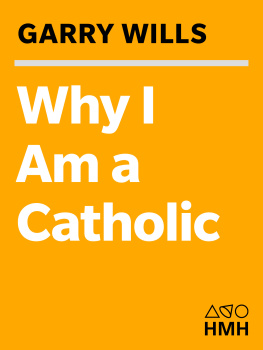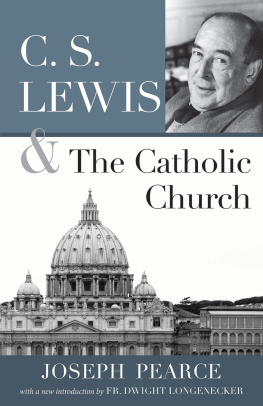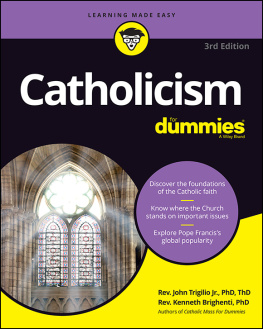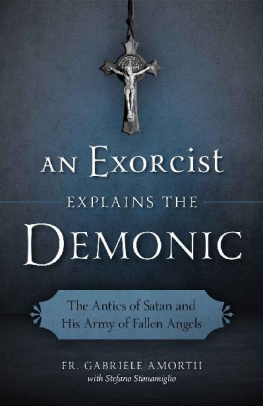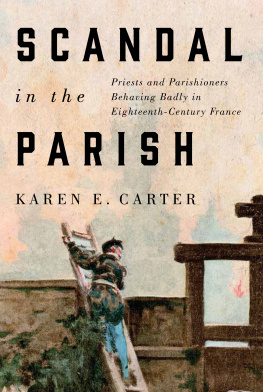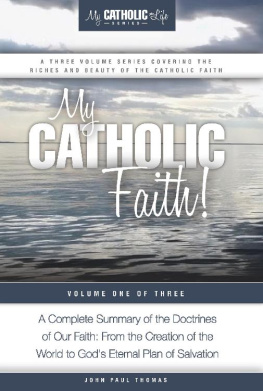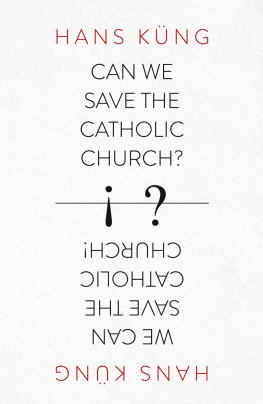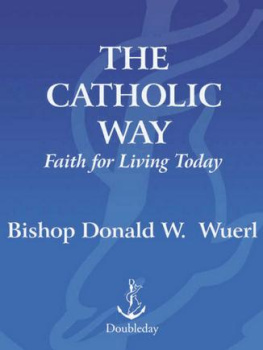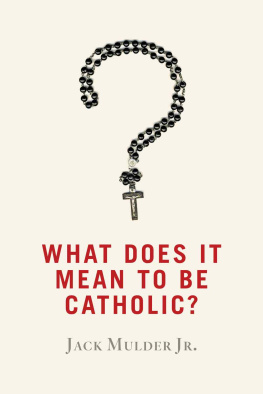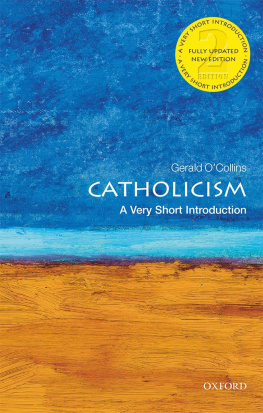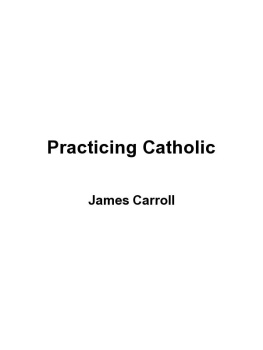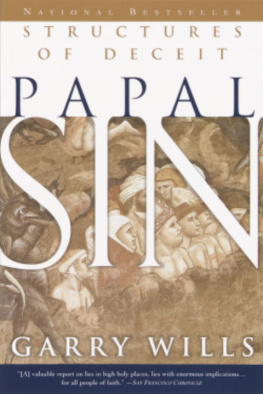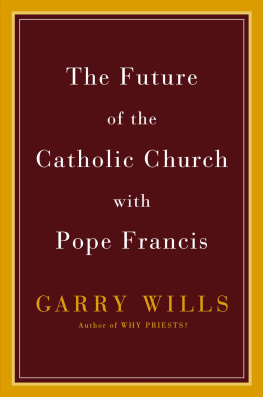First Mariner Books edition 2003
Copyright 2002 by Garry Wills
Introduction to the Mariner Edition copyright 2003 by Garry Wills
ALL RIGHTS RESERVED
For information about permission to reproduce selections from this book, write to or to Permissions, Houghton Mifflin Harcourt Publishing Company, 3 Park Avenue, 19th Floor, New York, New York 10016.
www.hmhco.com
Library of Congress Cataloging-in-Publication Data is available.
ISBN 0-618-13429-8
ISBN 0-618-38048-5 (pbk.)
e ISBN 978-0-547-52667-6
v2.0116
Excerpts from the poetry of G. K. Chesterton are reprinted with the permission of A. P. Watt Ltd. on behalf of the Royal Literary Fund.
TO ANNE OCONNOR
(Sister John Joseph)
Key to Brief Citations
ABD | The Anchor Bible Dictionary, edited by David Noel Freedman (Doubleday, 1992) |
AAS | Acta Apostolicae Sedis (Typis Polyglottis Vaticanis, 1909) |
ASS | Acta Sanctae Sedis (Typis Polyglottis Vaticanis, 18651908) |
F | W.H.C. Frend, The Rise of Christianity (Fortress Press, 1984) |
H | Judith Herrin, The Formation of Christendom (Princeton University Press, 1987) |
K | J.N.D. Kelly, The Oxford Dictionary of Popes (Oxford University Press, 1986) |
M | Colin Morris, The Papal Monarchy: The Western Church from 1050 to 1250 (Oxford University Press, 1989) |
P | Peter Partner, The Lands of Saint Peter: The Papal State in the Middle Ages and the Early Renaissance (Methuen, 1972) |
PL | Jacques-Paul Migne, Patrologia Latina (Paris, 18571867) |
S | Klaus Schatz, S.J., Papal Primacy, From Its Origins to the Present, translated by John A. Otto and Linda Maloney (Liturgical Press, 1996) |
Sch | Bernhard Schimmelpfennig, The Papacy, translated by James Sievert (Columbia University Press, 1992) |
Unless otherwise specified, translations are by the author. |
Introduction to the Mariner Edition
SOME WHO have read this book still ask why I am a Catholic. They must have a stereotypical view of what Catholics are, and I do not fit it. But neither do most Catholics. By large majorities they, too, differ from the pope on such things as contraception, married priests, women priests. They do not consider themselves non-Catholics, and neither do their priests.
But if I must spell out my loyalties in the most basic terms, I shall. I cannot leave the church because I would consider that a sina sin against the three theological virtues, a sin against faith, a sin against charity, a sin against hope.
It would be a sin against faith, because I would be saying that if the pope is wrong the church is wrong, and I must leave it. But I do not believe that the pope is the church. I never have, and neither have most Catholics through the ages. Neither did the Second Vatican Council. To act as if that were my belief would be a sin against my true belief in the church.
It would be a sin against charity, because I would be leaving my brothers and sisters in Christ. I have never had a religious belief, thought, or experience that did not come to me through the church. It has been the channel of every grace I have received. I have been formed and upheld by loving priests and nuns, by believing grandparents, parents, teachers, and friends. Why would I leave them? If the church is in difficulties now, that is a special reason for not leaving. And, as I say, most Catholics have the same difficulties with some current papal teachings that I have. We are in solidarity. To ignore that solidarity would be an affront to charity, to love for my fellow members of the body of Christ.
It would be a sin against hope, because I hope to be in communion with other ChristiansEpiscopalians, Lutherans, Eastern Orthodox, and others. The Second Vatican Council said that all baptized Christians are members of the mystical body of Christ. But I do not want to choose some other church as an individual, shopping around, saying this one is better than that, that my own is not a true church but some other is. That would be a cafeteria approach to religion. I hope to join with other Christians by the movement of my church as a whole. That has never been more possible than now, never since the Reformation. Pope Paul VI set up a process by which Catholic theologians worked out with Lutherans a joint statement on justification. It settled all the basic differences in theology that were at stake in the sixteenth century. Both sides admitted false emphases on their own side, true ones on the other side.
Joint ceremonies, studies, and activities go on at many levels between all the Christian churches now. There are no longer Protestant Bible scholars and Catholic ones. All who are any good are simply Bible scholars. There is a growing realization that the real scandal of Christianity has been the way Queen Elizabeth executed Jesuits and Queen Mary executed Protestants, or Catholics killed Huguenots, Calvinists killed Catholics. American Congregationalists hanged Quakers and American Protestants burned convents. See how these Christians kill one another. The prime task facing Christian churches, if they are to be truly Christian, is to find the Christ in each other. Most Christians now realize that. They are yearning for reunion, and even this pope has made many fine gestures in that direction.
But there, many say, is the rub: the pope. The papacy is what stands in the way. Other churches honor Saint Peter as first of the apostles, and there is no more obvious central point for a united Christianity than the site of Peters execution. But Protestants, no matter how they revere Saint Peter, know that he was not the bishop of Rome (there was no such office at the time). They know as well that there has been no unilinear descent of popes from that non-existent office. (On two occasions there were three contending popes, and all were deposed. In one case, an emperor started the new line, in the other, a council did.)
The ecumenical problem is typified by Cardinal Ratzingers decree that Anglican orders are not valid since their hierarchy does not branch from the papal descent. For once, Cardinal Ratzinger reminds me of the apostle Johnbut in one of Johns less admirable moments:
John said to him, Teacher, we saw a man expelling demons in your name, but we stopped him, since he was not one of us. Jesus answered: By no means stop him. No one who exercises power in my name can go on to speak ill of me. Whoever is with us is for us. Anyone who gives you a drink of water in my name, because you follow me, I tell you that person will not miss his reward.
(Mark 9.3841)
Anglicans have given far more than a cup of water in Christs name. And their church is apostolic in the only sense that it had in the first centuries of Christian history, that it teaches what the six apostolic churches were agreed upon. It adheres to the early councils and creeds.
Papal infallibility would, indeed, seem an insurmountable obstaclebut for the fact that it is a religious irrelevancy. No Catholic belief or action is based on papal infallibility. There never was such a thing until 1870, when the First Vatican Council declared the pope infallible under certain conditions. John Henry Newman said then that it was a power too unwieldy to be used, and that has proved true. It has been used only once, to declare what the church already believed without that pronouncement. There were churches, Masses, liturgies, and artworks dedicated to the belief that the Virgin Mary was bodily assumed into heaven. It was celebrated in the fourth decade of the rosary all Catholics had prayed. The popes addition of his own endorsement to this accepted belief made no real difference to the life of the church.
Next page
